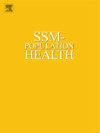Adolescent motherhood and the development of adolescent Offspring: Examining the role of selection versus early environmental factors
IF 3.1
2区 医学
Q1 PUBLIC, ENVIRONMENTAL & OCCUPATIONAL HEALTH
引用次数: 0
Abstract
Background
The study examines the adolescent developmental outcomes in education, mental health, and physical health of children born to teenage mothers at the start of the millennium.
Objective
It aims to understand the extent to which long-term developmental outcomes of children born to adolescent mothers are due to selection effects versus other factors.
Methods
It uses longitudinal data from the UK Millennium Cohort Study. Multivariate regressions examine the extent to which the association between maternal age at birth and adolescent outcomes is explained by selection into teenage motherhood, and how the relationship is mediated by the early environment and maternal behaviours.
Results
Teenage mothers are disadvantaged in terms of their backgrounds, and their children faced more adversity in their early environment. An unadjusted comparison shows that their adolescent offspring have lower academic achievement, and are more likely to be overweight or obese, but there are no differences in their socio-emotional adjustment. The ‘penalty’ from teenage motherhood in excess weight is due to negative selection into teenage motherhood. However, the differences in educational attainment of adolescents born to teenage and older mothers reflect both pre-childbearing selection and differences in the child's early environment. A decomposition analysis shows that maternal age accounts for only a low proportion of the variance in adolescent development.
Contribution
The study provides the first evidence on long-term outcomes of children born to teenage mothers for the UK. It studies the entire range of key developmental outcomes. It uses a novel decomposition to examine the relative importance of different variables for explaining variation in the outcomes of interest.
青春期母性与青春期后代的发育:考察选择与早期环境因素的作用
该研究调查了在千年之初由少女母亲所生的孩子在教育、心理健康和身体健康方面的青少年发展结果。目的了解未成年母亲所生子女的长期发育结果在多大程度上是由于选择效应而不是其他因素。方法采用英国千年队列研究的纵向数据。多变量回归检验了母亲出生年龄和青春期结局之间的关联在多大程度上可以通过选择成为少女母亲来解释,以及这种关系如何由早期环境和母亲行为介导。结果青少年母亲在背景方面处于劣势,其子女在早期环境中面临的逆境较多。一项未经调整的比较显示,他们的青少年后代学业成绩较低,更有可能超重或肥胖,但在社会情感适应方面没有差异。青少年母亲超重的“惩罚”是由于青少年母亲的负面选择。然而,青少年母亲和大龄母亲所生的青少年在受教育程度上的差异反映了孕前选择和儿童早期环境的差异。一项分解分析表明,母亲年龄在青少年发育的差异中只占很小的比例。这项研究为英国青少年母亲所生孩子的长期影响提供了第一个证据。它研究了整个范围的关键发展成果。它使用一种新的分解来检查不同变量的相对重要性,以解释感兴趣的结果的变化。
本文章由计算机程序翻译,如有差异,请以英文原文为准。
求助全文
约1分钟内获得全文
求助全文
来源期刊

Ssm-Population Health
PUBLIC, ENVIRONMENTAL & OCCUPATIONAL HEALTH-
CiteScore
6.50
自引率
2.10%
发文量
298
审稿时长
101 days
期刊介绍:
SSM - Population Health. The new online only, open access, peer reviewed journal in all areas relating Social Science research to population health. SSM - Population Health shares the same Editors-in Chief and general approach to manuscripts as its sister journal, Social Science & Medicine. The journal takes a broad approach to the field especially welcoming interdisciplinary papers from across the Social Sciences and allied areas. SSM - Population Health offers an alternative outlet for work which might not be considered, or is classed as ''out of scope'' elsewhere, and prioritizes fast peer review and publication to the benefit of authors and readers. The journal welcomes all types of paper from traditional primary research articles, replication studies, short communications, methodological studies, instrument validation, opinion pieces, literature reviews, etc. SSM - Population Health also offers the opportunity to publish special issues or sections to reflect current interest and research in topical or developing areas. The journal fully supports authors wanting to present their research in an innovative fashion though the use of multimedia formats.
 求助内容:
求助内容: 应助结果提醒方式:
应助结果提醒方式:


